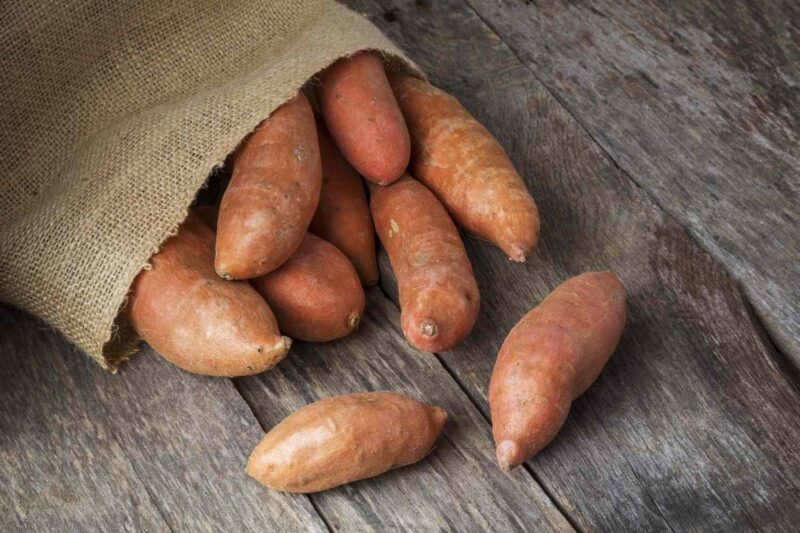As a copywriting journalist, I’m here to shed some light on the age-old question: Can you eat raw sweet potato? Sweet potatoes have gained popularity in recent years due to their nutritional value and versatility in cooking. But when it comes to consuming them raw, there are some important factors to consider.
First off, it’s essential to differentiate between sweet potatoes and yams. Although they are often referred to interchangeably, sweet potatoes and yams are two distinct plants with different characteristics. Sweet potatoes are native to Central and South America, while yams are native to Africa. The confusion arises from the mislabeling of sweet potatoes as yams in stores.
Now, let’s talk about the benefits of eating sweet potatoes. These nutritious tubers are packed with complex carbohydrates, fiber, vitamins, and minerals. In fact, sweet potatoes have been ranked as the most health-beneficial vegetable, surpassing even their cousin, the Irish potato. They promote healthy skin, regulate glucose levels, and can aid in weight loss due to their low fat and calorie content.
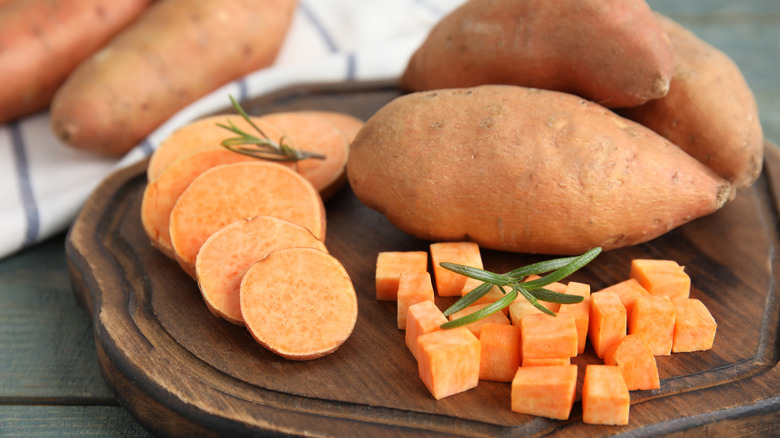
However, when it comes to raw sweet potatoes, it’s best to exercise caution. Eating them raw can pose risks due to the presence of harmful chemicals, including oxalates. These chemicals can have adverse effects on your health if consumed raw. Yams, which are often mistaken for sweet potatoes, also contain similar chemicals and require special preparation before they are safe to eat.
So, while the idea of munching on a raw sweet potato might not be the best option, there are still plenty of delicious ways to enjoy this nutritious vegetable. Incorporating sweet potatoes into a raw food diet can be done through creative recipes such as sweet potato noodles, smoothies, and salads. Just make sure to marinate or lightly cook the sweet potatoes before consuming to enhance their flavor and ensure their safety.
Key Takeaways:
- Eating raw sweet potatoes is not recommended due to potential harmful chemicals.
- Sweet potatoes are highly nutritious and offer a range of health benefits when cooked.
- Yams are often mistaken for sweet potatoes but require special preparation before consumption.
- There are creative ways to incorporate sweet potatoes into a raw food diet, such as spiralized noodles or lightly cooked salads.
- Cooking sweet potatoes brings out their flavor and ensures the removal of any potential harmful compounds.
The Difference Between Sweet Potatoes and Yams
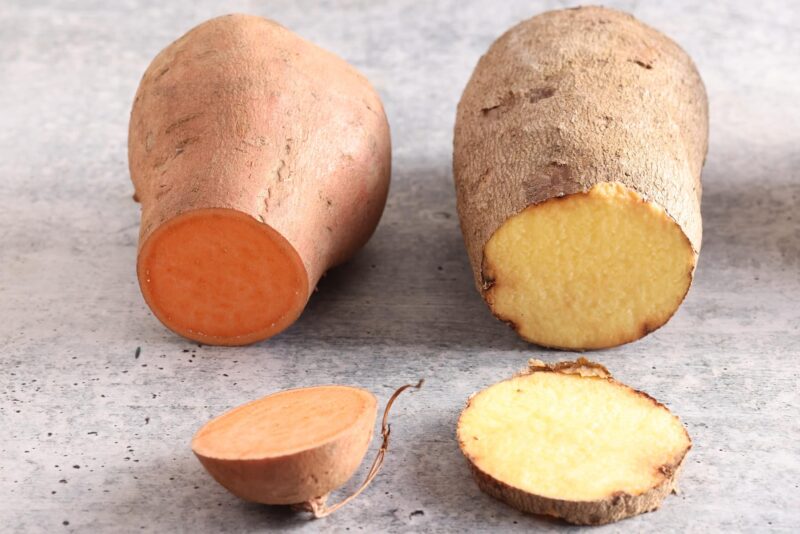
When it comes to sweet potatoes and yams, there is often confusion regarding their differences. Botanically speaking, these two root vegetables are unrelated and have distinct origins. Sweet potatoes are native to the Americas, while yams are indigenous to Africa. Despite their contrasting botanical relations, the confusion between the two arises from the incorrect use of the term “yam” to describe sweet potatoes in stores.
To set the record straight, sweet potatoes belong to the Convolvulaceae family and are more closely related to morning glories. On the other hand, yams are members of the Dioscoreaceae family and are more closely associated with lilies. In terms of nutritional value, sweet potatoes outshine yams and many other vegetables. They are packed with complex carbohydrates, fiber, vitamins, and minerals, making them a highly nutritious choice.
The Key Differences at a Glance
| Characteristic | Sweet Potatoes | Yams |
|---|---|---|
| Origin | The Americas | Africa |
| Botanical Relation | More closely related to morning glories | More closely related to lilies |
| Nutritional Value | Nutrient-dense, rich in vitamins and minerals | Contain certain harmful chemicals if eaten raw |
“The confusion between sweet potatoes and yams arose from the use of the term ‘yam’ to describe sweet potatoes in stores.”
To avoid further confusion, the United States Department of Agriculture (USDA) now regulates the use of the term “yam” to ensure accurate labeling and prevent misunderstandings. So, the next time you go to the grocery store, remember that what you’re most likely buying are sweet potatoes, not yams.
The Health Benefits of Sweet Potatoes
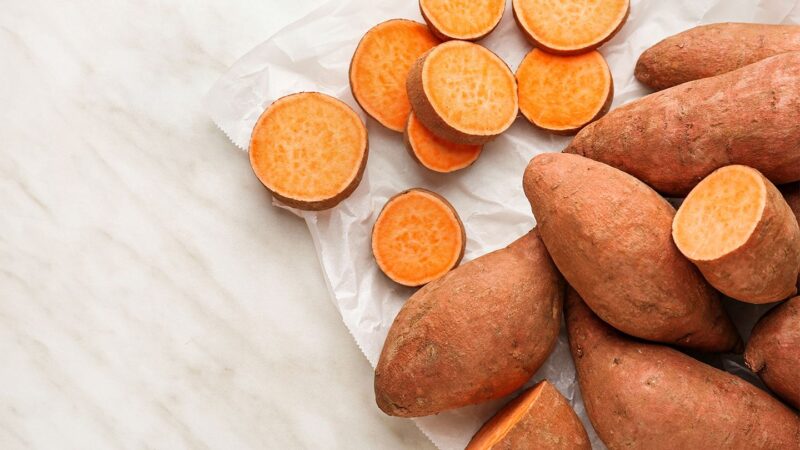
Sweet potatoes are highly nutritious and offer numerous health benefits. They are a great source of complex carbohydrates, fiber, vitamins, minerals, and antioxidants.
One of the standout nutritional features of sweet potatoes is their high content of vitamin A. Just one medium-sized sweet potato provides over 400% of the recommended daily intake of vitamin A, which is essential for maintaining healthy vision, supporting immune function, and promoting cell growth and development.
In addition to vitamin A, sweet potatoes are packed with other vitamins and minerals that contribute to overall health. They are rich in vitamin C, which helps boost the immune system and promote collagen production for healthy skin. They also contain potassium, which plays a vital role in maintaining proper heart and muscle function, and manganese, which aids in metabolism and bone development.
The Nutritional Value of Sweet Potatoes
To get a better understanding of the nutritional value of sweet potatoes, let’s take a look at the following table:
| Nutrient | Amount per 100g |
|---|---|
| Calories | 86 |
| Carbohydrates | 20g |
| Fiber | 3g |
| Protein | 2g |
| Fat | 0g |
| Vitamin A | 14187 IU |
| Vitamin C | 2.4mg |
| Potassium | 337mg |
| Manganese | 0.3mg |
Sweet potatoes are also rich in antioxidants, such as beta-carotene and anthocyanins, which help protect the body against oxidative stress and reduce the risk of chronic diseases, including heart disease and certain types of cancer.
Overall, incorporating sweet potatoes into your diet can provide a wide range of health benefits due to their high nutritional value and antioxidant content.
The Risks of Eating Raw Sweet Potato
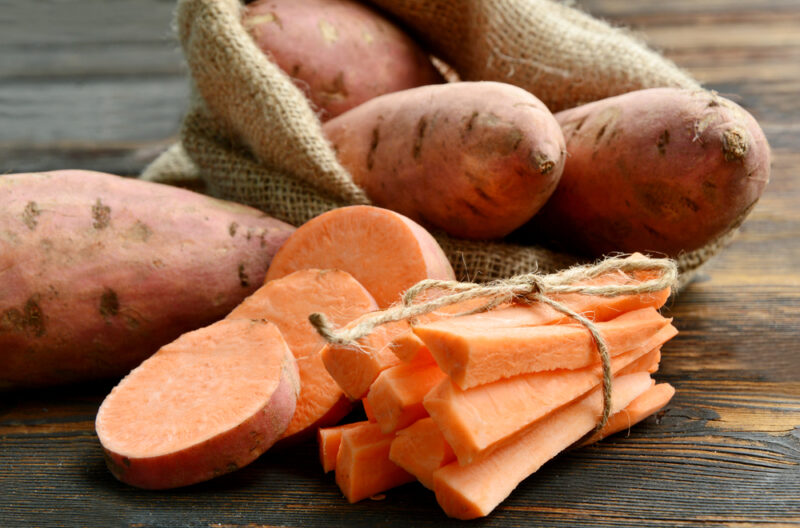
Eating raw sweet potatoes can pose several risks to your health. Sweet potatoes, like yams, contain chemicals that can have adverse effects if consumed raw. One of these chemicals is oxalate, which can contribute to the formation of kidney stones. Therefore, it is important to cook sweet potatoes thoroughly to ensure the removal of these potentially harmful compounds.
“Raw sweet potatoes can contain harmful chemicals, including oxalates, which can have adverse health effects if consumed. Cooking sweet potatoes not only enhances their flavor but also ensures their safety for consumption.”
Furthermore, raw sweet potatoes can be difficult to digest and may cause digestive discomfort such as bloating, gas, and cramping. Cooking sweet potatoes helps break down the fibers and complex carbohydrates, making them easier to digest and maximizing their nutritional benefits.
To enjoy the delicious taste and reap the nutritional benefits of sweet potatoes, it is recommended to cook them before consumption. Whether you prefer baking, boiling, steaming, or grilling, cooking sweet potatoes will not only make them safer to eat but also enhance their flavor and texture.
| Health Risks of Eating Raw Sweet Potato | Preventive Measures |
|---|---|
| Chemicals present in raw sweet potatoes, such as oxalates, can contribute to the formation of kidney stones. | Cook sweet potatoes thoroughly to remove these potentially harmful compounds. |
| Raw sweet potatoes can be difficult to digest and may cause digestive discomfort such as bloating, gas, and cramping. | Cooking sweet potatoes helps break down fibers and complex carbohydrates, making them easier to digest. |
Delicious Raw Sweet Potato Recipes
Although eating raw sweet potatoes is not recommended due to potential health risks, there are some creative and delicious ways to incorporate this nutritious vegetable into a raw food diet. Here are a few raw sweet potato recipes that are both healthy and tasty:
1. Sweet Potato Noodles
Using a spiralizer, you can turn raw sweet potatoes into noodle-like strands. These sweet potato noodles can be enjoyed raw or lightly marinated to enhance their flavor. Serve them with a fresh and vibrant sauce made from avocado, cherry tomatoes, and herbs for a refreshing dish that is packed with nutrients.
2. Sweet Potato Smoothie
Blend raw sweet potatoes with your favorite fruits and vegetables to create a creamy and nutritious smoothie. Add in some leafy greens, a banana for sweetness, and a splash of almond milk for a well-rounded and satisfying drink. This smoothie is a great way to start your day or enjoy as a post-workout snack.
3. Sweet Potato Salad
Create a raw and colorful sweet potato salad by thinly slicing the sweet potatoes and combining them with fresh vegetables like cucumber, bell peppers, and cherry tomatoes. Toss everything together with a tangy dressing made from lemon juice, olive oil, and herbs. This refreshing salad is perfect for warm summer days.
Remember, while these recipes involve using raw sweet potatoes, it is important to marinate or lightly cook them to ensure their safety for consumption. Enjoy the versatility and health benefits of sweet potatoes by exploring these raw food recipes.
| Recipe | Ingredients | Instructions |
|---|---|---|
| Sweet Potato Noodles | Raw sweet potatoes, avocado, cherry tomatoes, herbs | 1. Spiralize the sweet potatoes to create noodle-like strands. 2. Lightly marinate the sweet potato noodles with avocado, cherry tomatoes, and herbs. 3. Serve and enjoy! |
| Sweet Potato Smoothie | Raw sweet potatoes, fruits (such as banana, berries), leafy greens, almond milk | 1. Blend raw sweet potatoes with fruits, leafy greens, and almond milk until smooth. 2. Adjust the consistency and sweetness according to your preference. 3. Pour into a glass and enjoy! |
| Sweet Potato Salad | Raw sweet potatoes, cucumber, bell peppers, cherry tomatoes, lemon juice, olive oil, herbs | 1. Thinly slice the raw sweet potatoes and vegetables. 2. In a bowl, whisk together lemon juice, olive oil, and herbs for the dressing. 3. Toss the sweet potatoes and vegetables with the dressing until well-coated. 4. Serve chilled and enjoy! |
Cooking Sweet Potatoes: Tips and Recipes
Sweet potatoes are a versatile ingredient that can be cooked in various ways to create delicious and nutritious meals. Whether you prefer baking, boiling, steaming, frying, or grilling, there are plenty of preparation methods to suit your taste and desired texture. Here are some cooking tips and recipes to help you make the most out of sweet potatoes:
Baking:
Baking sweet potatoes is a popular and simple method that brings out their natural sweetness. To bake sweet potatoes, preheat your oven to 400°F (200°C) and scrub the sweet potatoes clean. Pierce the skin with a fork a few times and place them on a baking sheet. Bake for about 45-60 minutes or until tender. Once baked, you can enjoy them as a side dish or use them as a base for toppings like butter, cinnamon, or even marshmallows for a sweet twist.
Boiling:
Boiling sweet potatoes is another quick and easy way to cook them. Start by peeling and cutting the sweet potatoes into evenly sized chunks. Place them in a pot of boiling water and cook for approximately 10-15 minutes or until tender. Drain the water and mash the sweet potatoes for a creamy consistency. Add a touch of butter, salt, and any other desired seasonings to enhance the flavor. Mashed sweet potatoes can be served as a side dish or used as a base for dishes like shepherd’s pie or sweet potato gnocchi.
Roasting:
Roasting sweet potatoes brings out their natural sweetness and creates a slightly caramelized exterior. To roast sweet potatoes, preheat your oven to 425°F (220°C). Cut the sweet potatoes into wedges or cubes and toss them in olive oil, salt, and any other desired seasonings such as paprika or garlic powder. Spread them out on a baking sheet in a single layer and roast for about 25-30 minutes, flipping halfway through, or until they are tender and golden brown. Roasted sweet potatoes make a delicious side dish or can be added to salads for an extra burst of flavor.
| Cooking Method | Advantages | Disadvantages |
|---|---|---|
| Baking | Enhances natural sweetness | Takes longer cooking time |
| Boiling | Quick and easy method | May result in slightly softer texture |
| Roasting | Creates crispy exterior | Requires higher oven temperature |
Experiment with different cooking methods and seasonings to find your favorite way of enjoying sweet potatoes. Whether you prefer them as a side dish, in soups, stews, or as the star of a main course, sweet potatoes are a versatile and nutritious addition to any meal.
Conclusion

After delving into the topic of raw sweet potatoes, it becomes clear that eating them uncooked is not recommended due to potential harmful chemicals. However, this surprising truth should not discourage you from enjoying the numerous health benefits that sweet potatoes have to offer. As I explored the differences between sweet potatoes and yams, their nutritional value, and the risks associated with consuming raw sweet potatoes, it is evident that cooking these versatile vegetables is the way to go.
From their high nutritional content, including vitamins, minerals, and antioxidants, to their ability to promote healthy skin and regulate glucose levels, sweet potatoes are a valuable addition to a balanced diet. Cooking sweet potatoes not only enhances their flavor but also ensures the removal of any potential harmful compounds. By baking, boiling, steaming, or grilling them, you can unlock their delicious potential and explore a wide range of culinary possibilities.
Whether you’re following a raw food diet or simply looking to incorporate healthier options into your meals, sweet potatoes provide a fantastic alternative to other starches. While raw sweet potato recipes exist, such as those involving marinating or lightly cooking them, it is advisable to exercise caution and prioritize safety when preparing these dishes.
In conclusion, while raw sweet potatoes may raise concerns, the health facts and surprising truths about cooked sweet potatoes highlight their value as a nutritious food choice. So, embrace the versatility of sweet potatoes and discover the countless possibilities they offer in creating healthy and delicious meals. Incorporate them into your cooking repertoire and enjoy the benefits they bring to your overall well-being.
FAQ
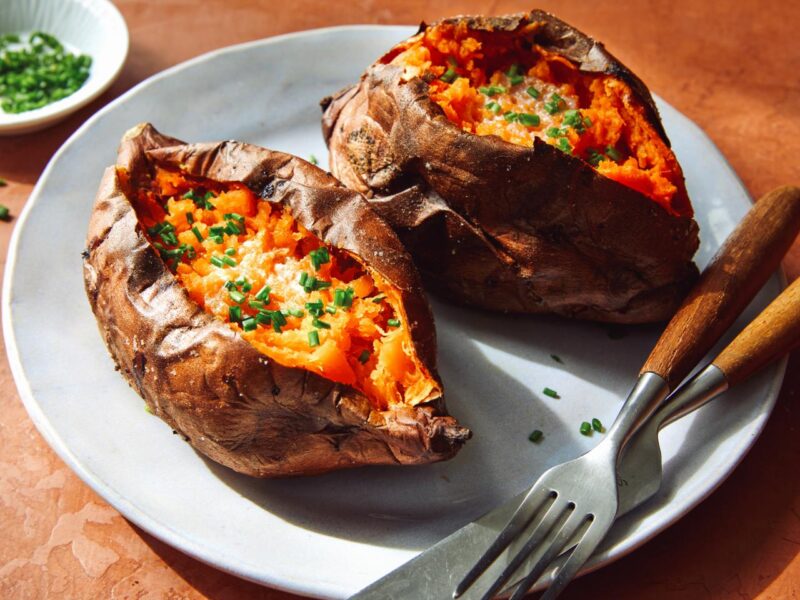
Can you eat raw sweet potatoes?
Eating raw sweet potatoes is not recommended as they may contain harmful chemicals and can have adverse health effects if consumed raw.
What is the difference between sweet potatoes and yams?
Sweet potatoes and yams are two different plants, botanically unrelated. Sweet potatoes are native to Central and South America, while yams are native to Africa.
What are the health benefits of sweet potatoes?
Sweet potatoes are highly nutritious and rich in complex carbohydrates, fiber, vitamins, and minerals. They offer numerous health benefits, including promoting healthy skin, regulating glucose levels, and supporting weight loss.
What are the risks of eating raw sweet potatoes?
Eating raw sweet potatoes can be risky as they may contain harmful chemicals, including oxalates. These chemicals can have adverse health effects if consumed raw.
Are there any delicious raw sweet potato recipes?
Yes, there are several creative ways to incorporate raw sweet potatoes into your diet. Some popular raw sweet potato recipes include sweet potato noodles, sweet potato smoothies, and sweet potato salads.
How should sweet potatoes be cooked?
Sweet potatoes can be cooked in a variety of ways, including baking, boiling, steaming, frying, and grilling. They can be used as a substitute for potatoes in various dishes and can be enjoyed both in sweet and savory recipes.

